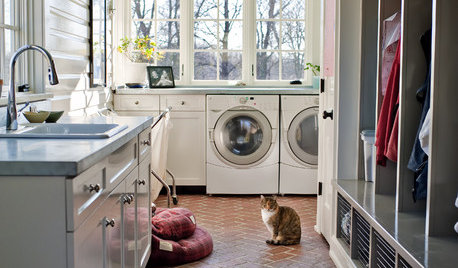Old owner dumped grey water from laundry onto lawn?
We just bought an old (1910) house on the eastern shore of MAryland, about a half block from the bay. We just discovered through an odd sequence of events that the old owner (1) never hooked up a sewer line to the washer, it jsut dumps grey water beneath the house into the sump pump and (2) the sump pump takes the water onto the yard - no gravel pit, just the dirt yard.
We bought the house as-is and had an inspection (which did not catch this).
I assume we are screwed, but it seems like the environmental violation for which he could still be fined would be enough to entice the old owner to pay to have a swer line brought over.
Any thoughts?
Comments (40)
joed
18 years agolast modified: 9 years agoYou bought it "as is" just fix it and leave the orginal owner alone.
winstonbike
Original Author18 years agolast modified: 9 years agoThats an interesting response - I would hardly claim to spend my weekends hugging trees, but dumping dirty water into ground that is a direct line to the Bay is considered pretty serious around here. Its just a scummy thing to do. Bringing a sewer line over is actually cheap, I just feel like he should be punished in some fashion.
In my mind, he doesn't really deserve to be left alone.
Related Professionals
Carson Kitchen & Bathroom Designers · Salmon Creek Kitchen & Bathroom Designers · Saratoga Springs Kitchen & Bathroom Designers · Springfield Kitchen & Bathroom Designers · St. Louis Kitchen & Bathroom Designers · Vineyard Kitchen & Bathroom Designers · Covington Kitchen & Bathroom Designers · Linton Hall Kitchen & Bathroom Remodelers · North Arlington Kitchen & Bathroom Remodelers · Port Orange Kitchen & Bathroom Remodelers · Sweetwater Kitchen & Bathroom Remodelers · Vienna Kitchen & Bathroom Remodelers · Plant City Kitchen & Bathroom Remodelers · Fort Lewis Architects & Building Designers · Henderson Architects & Building Designersjakabedy
18 years agolast modified: 9 years agoWhen you say "bring a sewer line over" do you mean actually running a new underground line? I don't know how your house or the existing sewer line is set up, but I would think it would be possible to simply tie the washer drain line into the existing waste pipe, no?
Of course, the laundry is probably in a former porch or something, but if you've got a basement or some sort of crawl space, I would think you could tie in somehow. It shouldn't be that expensive.
As for the PO, yes, it's frustrating. No, it's not his responsibility (unless there is some state or local law or code that requires disclosure of nonconforming plumbing -- probably not, though). Your inspector missed it, which stinks. But I think it's up to you to fix it.
sage63
18 years agolast modified: 9 years agoWe had this going on in our old home and there was no sewer line behind our house to run it to. We would have had to pump it up from the basement to the sewer line in front of the house. We decided to move the laundry to the second floor into a closet using a stacked front loader system. It was cheaper than the pump and system to get the basement set up to code. I love having it up on our bedroom level!! It was a blessing in disguise.
morgan88
18 years agolast modified: 9 years agoinspectors seem to miss a lot. winstonbike, i commiserate.
joed
18 years agolast modified: 9 years agoI'm not saying don't fix it. It should be fixed. I'm just saying you bought it "as is" I don't see any reason to go after the old owner. If you want to go after anyone go after the inspector who missed it.
bmmalone
18 years agolast modified: 9 years agowe had the same thing, only our house is about 140' from the lake. Like you, we bought 'as is' and the previous owner was covered by this. Turns out that three out of five houses dump the water directly into the yard. The county is now actively looking at this problem. It has taken about five years to fix our house, but we had major termite damage (inspection found minor termite damage), bad wiring and a 'home made' - ie block and no field line - septic tank. We also had a gun shot hole in the kitchen ceiling that went right up through the roof!
lesliew
18 years agolast modified: 9 years agoWe had the same situation. The washing machine literally emptied out through a hole in the wall into the shrubbery. the laundry sink and the washing machine, as well as the kitchen sink and dishwasher (illegal) ran into a sump pump in the basement which channeled it into a gray water box, which, it turned out, was full, and falling apart. We had to have our plumber run the kitchen stuff as well as the washing machine and laundry sink in the basement into a sewer ejector pump which then feeds into the main line. We have no sewers, we have cesspools. Engineer missed all of that - he thought only the landry sink emptied into the sump pump. Turns out it is not code to have a sump pump emptying water out of the house, either - it is supposed to remove outside water which comes into the house. In addition, the sump pump was hooked into the outlet with an ordinary household extension cord.
scryn
18 years agolast modified: 9 years agoJust a question:
Where I grew up in the ny suburbs we had leachfield (sorry I don't know if that is how it is spelled). These were similar to septic tanks however they would not have any sewage. They would collect water from the washing machine only. They would let the water drain slowly into the soil and they were NEVER pumped out like a septic tank. These were/are legal.
Is this really any differnet than dumping the water on the soil? I think the environmental impact would be very similar.don't get me wrong, I think that dumping your wash water on your lawn is wrong, unless you use special detergent. I use environmentally sound detergent that does not contain phosphates. Also bleach and other chemicals (softener) would be bad to use also. I still don't think I would water my lawn with the water though!
So basically this boils down to two questions:
Is a leachfield something that is cheaper than running a sewer pipe? Maybe you can have one in your area. Also is it REALLY illegal to dump your washing machine water into the soil? We have an inground pool and to empty and backwash it goes directly into our lawn! I think these chemicals would be worse for the soil. However this is how all inground pools are built! When we bought the house and first backwashed the filter my husband and I thought that it was illegal, We just couldnt' think that having a spout of chlorinated water, with other nasty chemicals, running into our ground water would be OK!I just ask about if it is legal part because it may be! It could be stupid sounding to all of us and something that noone would think of doing but maybe it is legal!
Regardless, I think it should be fixed also.
good luck
-reneelesliew
18 years agolast modified: 9 years agoHere in NY it IS illegal today to dump the water onto the lawn. Many years ago, it was not considered a violation, but today it is. Actually, the code on water discharge, at least here in Nassau County, is almost ludicrous. All water, even from roof leaders, has to be discharged into dry wells or at least underground. No water is supposed to be discharged onto the property. The worry is that it will then get onto the streets, and you are supposed to keep your water on your own property.
scryn
18 years agolast modified: 9 years agoI know buffalo has a law like that also.
However where I live it is not a law. We can just have our gutters put water onto our lawns or where-ever.
The law is different for each county.
-reneetom418
18 years agolast modified: 9 years ago"We bought the house as-is and had an inspection (which did not catch this). "
Then your problem is with the inspector. By your own admission, you bought the house "as is".
lynxville
18 years agolast modified: 9 years agoI have a home in the country and everyone dumps the grey water in the yard. A leach bed does the same thing. There is nothing toxic in there but some soap. Remember when they empty a septic system they spray everything in a field and let it dry. It then returns to the aquifer. Once it filters through sand etc. it's drinkable. The plants love it.
joed
18 years agolast modified: 9 years agoThey don't spray septic in fields around here. They take to the waste treatment plant.
MongoCT
18 years agolast modified: 9 years agoYour inspector is the one you need to be looking at. Not the previous homeowner.
It was common in the past to dump gray water onto lawns or into the landscaping. It was all the rage as a recycling method back in the late 60s and early 70s. It helped green up the plants and it avoided adding laundry water to older septic systems, possibly overwhelming them.
With egreen laws being passed, it's now often illegal to do so. Especially, and almoist always certainly, in coastal/inland waterfront/wetlands areas. The reason is the phosphates and other additives that were in many laundry soaps.
The phosphates were running off into lakes, streams, etc, eventually making theiur way into lakes and ponds. Everything from algae blooms on the surface to oxygen starvation in the water itself.
You want to go after the previous owner, have at it. But "as is" means just that. Unless there was some sort of intentional coverup and you can get some form of disclosure from a third party, such as a neighbor, that he intentionally hid this from you as he thought it might alter the terms of the deal.
Your home inspector? Go after him. Ask why he missed it, and what he's going to do to make it up to you.
In the interim, use low- or no-phosphate laundry soaps, the stuff from "Seventh Genration" is pretty friendly to Mother Nature.
scryn
18 years agolast modified: 9 years agoMethod laundry detergent is also phosphate free. I really like it and you can find it at their website. They also have HE detergent. I don't know what kind of washing machine you have.
-reneenancylouise5me
18 years agolast modified: 9 years agoBuying the house "as is" means just that. With all its' faults. You could try going after the PO but that I'm sure would end up at a dead end. It stopped being his concern when you signed the final contracts at closing. Reread the ispectors report. They usually are so vague as to not make themselves responsible if anything pops up later. Call the inspector and talk about it with him. That would be your best bet. NancyLouise
chuckr30
18 years agolast modified: 9 years agoPersonally I can't see a problem putting laundry output into your bushes, but gray water from a kitchen sink has lots and lots of bacteria, and food for the bacteria. This is a health hazard and one reason why the counties don't want people dumping gray water into their lawns.
Imagine dumping milk from your cereal into a bucket, food particles from rinsing dishes, old juice, moldy foods, then putting it outside in the warm sun for a week or two. You could get a pretty hearty mold and bacterial growth going.
vjrnts
18 years agolast modified: 9 years agoImagine dumping milk from your cereal into a bucket, food particles from rinsing dishes, old juice, moldy foods, then putting it outside in the warm sun for a week or two. You could get a pretty hearty mold and bacterial growth going.
But you're not putting a bucket of contaminated water out in the sun for a few weeks; you're putting bacteria-laden water on the ground, where the water soaks into the dirt and there are insects and environmental bacteria and mold to break down the organic contaminents. All of the food particles are easily biodegradeable, and they do degrade quickly. I wouldn't do it, because this breaking down process can be smelly, but it's not dangerous.
A compost heap does the same thing. It allows bacteria to break down food leavings.
lazypup
18 years agolast modified: 9 years agoIn order to fully understand this discussion we must first define exactly what "Gray Water" is.
When cities first began installing municipal sewer lines all water was simply discharged into the local lakes, rivers, bays and estuaries. While most larger cities had begun installing underground tunnels or piping systems, in many instances that water was simply conveyed in open ditches.
In those days Typhus, Dysentery, Numerous plagues and E-coli outbreaks were commonplace. As medical science began to identify the microbes which caused those diseases it was believed they were being transmitted by solid particulates in the sewer waters, therefore they introduced the terms "Blackwater" and "Graywater".
Blackwater was defined as any sewage discharge that contained solid particulates, while Graywater was sewage water that did not contain solids, such as bathwater, kitchen sink water or laundry water.
While in the USA there are some records of houses having indoor plumbing as early as 1650, and some cities having municipal sewers by 1675, for the most part the concept of indoor plumbing did not really become commonplace until the mid 1920's.
In the days of the outhouse it was common to keep a "Chamber Pot" in the bedroom so you didn't need to get dressed and trudge out to the outhouse during the nite.
Given that solid wastes were still being discharged into the outhouse or in the chamber pot and eventually in the outhouse, the remaining effluent water from a residential structure was considered "graywater"
Indoor plumbing still did not become common in rural areas until well into the 1940's or later. (On a personal note, I was born in 1947 and can remember living in two different houses that still had a Dry sink in the kitchen and an outhouse up until 1954.)
In the days of dry sinks and outhouses it was common to wash dishes in a dishpan and discard the water by simply tossing it out the back door into the yard.
In my collection of old Plumbing code books I have a 1940 Ohio State Plumbing Code book that not only describes the proper layout of the DWV piping we are so familiar with today, it also had a chapter devoted to the proper construction of cesspools and outhouses. (An interesting side note, the code required a hole be cut above the door as a vent, and that explains why the outhouse commonly had the half moon cutout.)
It was not until the post World War II building boom that indoor plumbing really became the standard and many Plumbing codes still have references to "Graywater" and "Blackwater" until the late 1960's.
The Enviromental Protection Agency (EPA) was enacted in the late 60's (abt 68 or 69) and didnt really begin enacting legislation until 1970. One of the first items they address was a clean water act in 1971 that defined all sewage, both graywater and blackwater as "Sanitary Waste" and mandated that it must be discharged into an approved septic tank or municipal sewer system.
They then mandated that all municipalities were required to install sewage treatment plants to treat the sewage before discarding the excess water into streams or estuaries.
In order to insure that the regulations would be adherred to they enacted some very exhorbitant fines for violation of the clean water act. Under the current regulations the EPA can fine up to $10,000 per day for every day of proven offense for willfully discharging sanitary waste into the watershed.
Originally the cities only had one set of municipal sewer lines, which handled both Sanitary waste and storm runoff, but it was soon determined that the volume of storm drainage was overwhelming the sewage treatment plants.
Municipalities are now required to have to independant sewage systems, the Sanitary Sewer system which discharges into the sewage treatment plant and the Storm sewer which may empty directly into a stream without treatment. This explains why your gutters and downspouts or sump pumps MAY NOT BE connected to a sanitary sewer. On the other hand, you may not discharge a sink, laundry tub or washing machine into a sump pump pit. (In my city they are now randomly installing Dye Marker Pellets in peoples downspouts and if the colored water appears in the sanitary sewer the homeowner can receive a substantial fine).
In recent years there has been a big concern about conserving water. In response, some states (Primarily those in in arid areas such as California, Arizona and New Mexico) have been working with the EPA to enact a means of recycling residential Graywater.
Under the current regulations there are two systems that are classified as "Graywater systems".
1. One system permits bathtubs, showers, lavatory sinks, water coolers and some "process water" such as the discharge from geothermal systems to be discharged into an approved "Graywater Digester". The Digester must have a minimum capacity equal to the amount of graywater produced by the structure in a 72 hour period. The graywater may then be used solely for flushing toilets or lawn irrigation, but the total amount consumed by day may not exceed the amount generated in a 48 hour period. In addition, the Graywater digestor MUST BE installed by a licensed Plumber with a special certification in graywater systems, and the digestor must be maintained under annual contract. Under no circumstances may a homeowner install or service the unit.
The second variation of a graywater system is only permitted in commercial applications. Large buldings such as high rise apartments or office buildings may use the roof of the structure as a capature method to capture and hold rainwater which may then be used solely to flush toilets within the structure.
david_cary
18 years agolast modified: 9 years agoWow - you are not a "lazypup" - that was interesting info.
I have always thought that the use of graywater was pretty commonplace. My Grandfather said that his irrigation was greywater - and told me not to play in it. Miami - house circa 1950 and this was late 1970s. I also thought that in the municipality I live in, there was a short time where the requirement was to have a greywater system as the city was growing too fast to obtain enough water supply - mid 1990s.
I am amazed that some muncipalities require roof drainage to go into the sewer system. It is just water - I'd drink it if it was convenient. I live in an area with adequate soil drainage for the most part. We have some rules about building on a certain percentage of the land near water supplies but that is about it.
I am one with the thought that it shouldn't really matter that laundry water goes out to the lawn. I'd store it and irrigate plants with it. I would just watch which detergent I used. Laundry water is pretty darn clean - unless maybe if you are washing diapers. Right now - I think my laundry effluent is a terrible waste of perfectly good water.
I also am for going after the inspector. There are probably disclaimers all over the place but I bet that doesn't mean much. If he is licensed by some govt, then he will have some legal responsibility. I wouldn't be surprised if he has some malpractice insurance. I live in a place where houses are new and inspections are a joke for the most part. But I would imagine inspection of a 1910 house is an expensive and complex proposition. One that should have legal protection.
cynic
18 years agolast modified: 9 years agoGood grief! Everyone wants to sue somebody I guess. A few comments:
- "...the environmental violation for which he could still be fined..."
Uh, are you *sure* about that? Often people try to make trouble for others and only make trouble for themselves. After all, wouldn't the authorities be more likely to fine the owner of the property than a previous owner? This could really backfire if you're not careful.- As said, "as is" means that, and for a purpose. It will vary according to location, but the situation could be that you're SOL by your contract. You'd have to check with a competent lawyer to determine that. Did you demand and receive disclosures on the property? What was in there? In some areas, known but non-disclosed defects would not be covered by an "as is" clause. However if you didn't require a disclosure, you probably waived it. It's unbelievable how many people buy as-is and don't require a disclosure. Absolutely incredible.
- The inspector is just that. Inspecting, not insuring. Did you get an insurance policy from him/her for defects? Of course not. And no, inspectors aren't licensed. They don't have to be. Some are members of ASHI or something like that and that's about it. You likely only paid a few hundred dollars for a cursory inspection. If you wanted him/her to tear apart the house, dig up the yard, go through courthouse records to ascertain the chain of title and the like, you would be pay a lot more. So about the best you can do is to talk with them to alert them to the item they missed so they might catch it in the future. Inspectors are no more liable for a house defect than a lawyer is for losing a case. There's no guarantees here.
I'm reminded of a guy I know who decided to play lawyer and sue his ex-wife to lower his alimony. To make a long story short, he thought he would have fun making trouble and expense for is ex. In the end, the court quadrupled the alimony and additionally ordered back pay for four years! Needless to say he also had to pay her expenses, and of course she had a competent lawyer who wasn't cheap. So the idea of making trouble for someone can easily backfire if you're not careful.
Instead of getting all worked up, you're probably better off to chalk it up to experience and move on.
lazypup
18 years agolast modified: 9 years agoDavid Cary:
A point of clarification. They do not require gutters and downspouts to be connected to sewers. Normally gutters and downspouts are discharged directly on the lawn, but in instances where it would be desirable to discharge it into a sewer it MUST BE discharged into a Storm Sewer, not a Sanitary Sewer.
Discharging downspouts or sump pumps into Sanitary Sewers is prohibited.
glassquilt
18 years agolast modified: 9 years agoI also remember that years ago water was 'reused' if it was clean. My mom't classmate had a laundromat in the desert (San Diego area) and the water was directed to the land behind the building. I know someone else who had owned a very old house (mid 1800's) for years. One recent summer the kitchen sink wasn't draining right and when they looked into it, they found that it drained into a dry well. The only reason they had trouble was en extremly wet spring and 'filled' the dry well.
lazypup
18 years agolast modified: 9 years agoI have a very good friend in Milton, Fla who originally had a mobile home sitting on a private lot, which he later removed and installed a double wide mobile home.
In his back yard by the carport he had a small 6 x 10 tin storage building and in that little shed he had an old washing machine that he occassionally used to wash out shop rags. Having no drains in the shed he simply cut a small hole in the wall and ran the washer hose out the hole were it discharged on the lawn, maybe one to two loads a month on average.
One day while the washer was pumping out a nosey neighbor woman went by on a bicycle and she saw the water pumping out. she then called the EPA and reported my friend for willfully discharging effluent on the surface.
The EPA came out and fined him $2000 and told him that he had ten days to run an approved drain line to the shed. He said, "hell no, i will just get rid of the washer."
The EPA argued that there would be no wsy to insure he wouldnt get another washer at a later date so he must run the drain line or face another $5000 fine.He then applied for the necessary Plumbing Permit to run the line to appease the EPA.
The Zoning commission checked their records, as well as the report from the EPA and they determined that his present septic tank was not big enough for the double wide plus the additional drain so he then had to install a new septic tank.
His property was within the 1 mile perimeter of the Escambia Bay flood plane so he had to install an above ground septic tank, which was the first one I ever had the misfortune to work on.
To install the septic tank we had to construct a pit above ground with railroad ties 4' high and 24' x 36'. A new septic tank was set inside the pit on the house end with the base of the tank sitting on the ground. We then had to have the entire pit filled with sand to the top of the pit wall(five 40' tractor trailer dump loads).
We then laid the leach field pipe on the surface of the sand and additional sand had to be brought in filling the pit above the top so that all sides had a 30deg slope, then the top had to be covered with Sod.
Now, since the input of the septic tank was now higher than the building drain under the double wide we had to install a "sewage Ejector lift station" to pump the sewage up to the tank.
When all was said and done the total cost was over $43,000 and to add insult to injury, once the pit was constructed the east wall of the pit was so close to the little shed that you could not get the shed door open.
Please beleive me when i say the EPA does not take this matter lightly, and the consequences can be financially devastating.
lambsy13
18 years agolast modified: 9 years agoHere's one for ya-
I have been house hunting and recently came across a home built in 1917 that i am interested in buying. i just had the inspection done and during the inspection, we found a hole in the basement that loooked to be a drain- it wasnt. it was a watery dirt hole that all the laundry water still currently goes into. there is no outlet pipe. the grey water just soaks into this dirt hole! I can't imagine that this is good for the foundation of the home or moisture content in the basement..upon many other concerns.
upon a secondary inspection the plumber thought a sump pump should be installed and the laudry line re-routed in the main sewer line.
the whole basement is carpeted and we can't seem to locate a "normal drain" in the basement- so that seems about right. My only concern is that if this has been going on for "x" amount of years, what problems would i be looking at?lambsy13
lesliew
18 years agolast modified: 9 years agoWe were told that, at least here in NY, a sump pump is illegal, except to pump out water which is coming INTO the house. The plumber installed a sewer ejector pump for the washing machine and sink in the laundry room.
spambdamn_rich
18 years agolast modified: 9 years agoIt's a misconception that laundry detergent phosphates would contaminate lake or river waters if the washing machine effluent were to be sent into a leach field or spread efficiently on a lawn area.
The reason is that phosphates don't migrate very far in soils. Instead they bind to the soils (which is part of the reason why they make such great cleaners). So they are unlikely to make it more than a few feet from where they were introduced.
Phosphates may be an issue when large amounts are dumped from a sewage line or primary sewage treatment plant directly into a fresh water body. But even then, normal human waste in sewage contains as much if not more phosphate as once was used in laundry detergents. Secondary and tertiary sewage treatment can remove most of the phosphate burden, as well.
Personally I'd be more concerned about the sodium in detergents (from sodium carbonate) or, even worse, the boron in borax if that is used. Boron is toxic in more than trace amounts for many plants...
tom999
18 years agolast modified: 9 years agoThis was a fairly common practice and still is in many parts of the country. If this is grandfathered in, chances are he is not breaking any laws and you would have no grounds for a claim with him. Check your local building codes and also check when the codes were put into place.
jcin_los_angeles
18 years agolast modified: 9 years agoLos Angeles is starting to look into grey water use. Here's more info: http://www.oasisdesign.net/greywater/buildersguide/
It certainly makes sense to use grey water in an arid climate, as long as you don't put it on food crops.
beaglebuddy
18 years agolast modified: 9 years agoIn some places like lazy pups friend, authorities seem to go crazy over things like this, but in other places, like where I have a house in Santa Cruz county Ca. everone seems to be dumping greywater and in the unlikely event you are caught they would just make you put in a greywater cesspool tank.There are books written about using greywater, I used to have a booklet that described how to put in a system using wyes with valves on all the sinks and laundry so you could switch back and forth between sending greywater down with the sewage or off to use for irrigation. A set up like this can be usefull to save your septic from backing up during very wet weather when the ground becomes saturated
brycenesbitt
11 years agolast modified: 9 years agoWhere I live in Berkeley, CA this arrangement is perfectly legal. In a city where sneezing almost requires a permit, laundry to landscape is considered so harmless it requires no building, zoning or plumbing permit. See the link for details.
Here is a link that might be useful: City of Berkeley Graywater
DJL 1955
3 years agoWhat kind of pre sale property inspection does not pick up on where the laundry discharges ? I would install the sewer line and send the bill to the inspection Company via your attorney
HU-720598678
2 years agoMy neighbors are running grey water from washing machine into my creek. It runs to our lake, but it only runs with heavy rain. The water is sitting festering and stinks like sewage million of mesquitas in the summer, the water is black and thick. I've asked them to fix it but with no prevail. It's in the state of Kentucky and I'm sure it's illegal. What should I do ask again or file a claim with
Travis Johnson
3 months agolast modified: 3 months agoWe have grandfather laws in this country so while new places must conform with new laws, older places do not have to update unless something major is changed.
As a farmer we had this in my county. The local lake was polluted and they said farmers were to blame No way. Here only 10% of land is field so we could not farm hard enough to pollute the lake that bad.
So we hired divers and they traced septic lines back to houses on the lake. In the 1920,s these were camps, not houses, but over time people converted camps to year a round houses and just kept the old wastelines as proper septic systems would be expensive. After 10 houses the Maine Dept Environmental Protection told us to get the divers out and that it was farmers doing the polluting. It was just too big of a problem to tackle as no one has any money to put in septic systems everywhere and they know it.
I would not think a washing machine would be an expensive fix however.
T Jarmuth
3 months agoWe bought a 1945 farmhouse 30 years ago and the laundry water discharge went out to the backyard and fed a healthy flowering cherry tree. Because it was “gray water” we had no immediate concerns and eventually repiped the washing machine to the septic system. I honestly do not think this is an environmental issue. If it were “black water” you would be in a heap of trouble due to nitrates, etc.



















Carol_from_ny